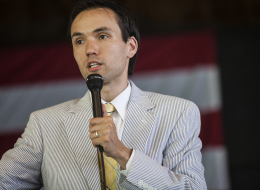"Hey, the pickins' in this state belong to us, no friggin' outsider need apply. Screw the voter, two candidates are too much bother for them now as it is!"
By: Rachel Blevins Aug 12, 2014
By: Rachel Blevins Aug 12, 2014
Running as a Libertarian candidate, and attempting to defy the two-party system is not an easy task in the United States, and Robert Sarvis is one candidate who knows the many obstacles that come when running for a third party.
In addition to being a current candidate for the U.S. Senate, and a resident of Virginia, Sarvis has had experience as a lawyer, teacher, software developer, businessman, and politician.
In his time running as a third-party candidate, Sarvis has found that he has been excluded from the major debates that are known for putting candidates in the spotlight.
Although he only needed 10,000 signatures to have his name included on the ballot, Sarvis gathered 19,000 signatures from registered voters.
Despite the voter support, Sarvis told the Richmond Times-Dispatch that his exclusion from the debates was influenced by the demands of his Republican opponent, Ed Gillespie, and his Democratic opponent, Senator Mark Warner.
"It's incredibly frustrating," said Sarvis. "It's one thing to run in a fair process and lose. It's another thing to see the candidates of the two major parties use the process and try to rig it in their favor."
Sarvis' proof that both Warner and Gillespie campaigns pressured debate organizers not to invite him came in the form of an email. In it, a representative of James Madison University's Student Government Association responded to an inquiry about Sarvis' participation in the debate, saying, "Both campaigns had stated that if Mr. Sarvis were to be invited to participate in the debate their chances of agreeing to accept the invitation was unlikely and actually committing was even less likely."
In response, Sarvis called his opponents' actions "intellectual cowardice," and he said he thinks it is "pathetic that a sitting senator would do this."
Stephen Farnsworth, a political science professor at the University of Mary Washington, acknowledged the fact that "there is political space for libertarian ideas in this country," but also said that while Libertarian candidates do have difficulty getting into debates, it is an extremely important factor on Election Day.
"It's hard to draw much attention to yourself if you're not part of the debates," said Farnsworth. "The two major parties tend to agree that Democrats and Republicans should control the discourse. The biggest challenge for the Sarvis campaign is something that is totally out of his hands."
The increase in popularity in the Libertarian movement has even caught the eye of The New York Times' Robert Draper, who wrote, "Libertarians, who long have relished their role as acerbic sideline critics of American political theater, now find themselves and their movement thrust into the middle of it.
"For decades their ideas have had serious backing financially, intellectually and in the media," wrote Draper. "Today, for perhaps the first time, the libertarian movement appears to have genuine political momentum on its side."
The following two tabs change content below.
Rachel Blevins
Rachel Blevins is a student in the College of Media and Communication at Texas Tech University. She aspires to break the left/right paradigm in media and politics by pursuing truth and questioning authority as she establishes her journalism career.
via benswann
